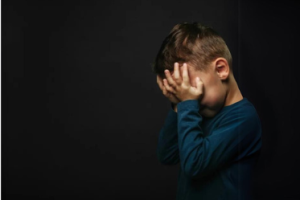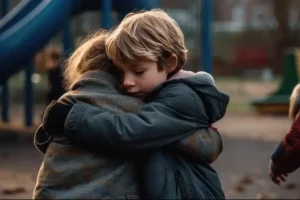The excerpt below is from our webinar: Understanding BDMD Behaviors for Adolescents & Adults. Thank you to psychologist Dr. Natalie Truba of Nationwide Children’s Hospital for being our outstanding guest speaker. Click here for the full webinar.
Adolescence is an incredibly important period from a critical learning standpoint.
Puberty is a hell of a drug and it does a ton in the brain during adolescence. In particularly, it has a huge role in reorganizing the neural pathways of the prefrontal cortex and that is important in adolescence, for a lot of reasons.
Perceptions
But maybe something even more unique for these boys with Duchenne during adolescence, is how they see themselves in relation to other people. Those perceptions during this time are incredibly important in identity formation.
When you think about how humans have evolved in the context of a family, there’s a period where it’s super important that you actually start to disengage from your family a bit. Humans need some space to gain a sense of:
- “Who am I in relation to my family?”
- “What do I like and not like?”
- “What pieces of my family’s values that I’ve learned do I want to preserve?”
- “Which pieces of these values do I want to do differently?”
And this need for space has evolved with us as humans. It’s a period of time where you are able to do more on your own – or your parents can give you that space – and you can take those social risks to feel those answers out.
Well, when you have dependent needs, that’s automatically interrupted. Right?
If we miss that period, it can be hard to shift into that mindset of being a person separate from the family, because we’ve missed learning a lot of skills. Now, we’re all the adults on the call – do you remember going through puberty? I don’t think any of us would be like, “Yeah, let’s do that again!” Right? So, you know – puberty’s a heavy thing.
So how do we help our adolescents with Duchenne navigate puberty and navigate this process in a way that helps them to facilitate a concept of identity formation? How do we help them create a sense of self so that they can get to a place that they can separate, disengage and spread their wings? How do we help them do the things that they want to do and that they feel capable of doing? Especially in the sense that – “I do see myself as a separate person than my parents and I do want to do my own thing a little bit” – or even just have a life outside of the family unit.
And so, we are just now starting to identify the issues of, “What do we do to help our adults with Duchenne who have missed these learning opportunities?” We have got a long, hard way to go to identify what will actually help us navigate developing a high quality of life in adulthood with Duchenne. And so, identifying these things in adolescence and encouraging them to lean into that space of identity formation, I think is really important.
Adolescence is also a time when we start to really refine those skills needed to be a successful adult. If you’re not really engaging – if you’re not going out and separating from your family – then you’re also not learning important skills. Skills like:
- how to navigate peer conflict
- how to initiate conversation
- how to manage rejection
- how to date
You know, there’s pain that comes with learning those skills, right? And that’s part of why hopefully you do it when you’re young – so that you have a soft place to land. If you do mess up, you’re not going to mess it up too badly. You have a family or a team as an adolescent to help out. But the stakes are a lot higher in adulthood.
And so, when learning those skills is missed, you kind of lose your “easy opportunities” to practice those things. And, you know, the transition from adolescence to adulthood isn’t magical, right? It’s not like you’re 17 years old and 364 days, then you turn 18 years old overnight and all of a sudden, you have all these skills, right? That’s just not how it goes.
And so, I think, we get so focused on helping the boys be physically healthy, that we sometimes forget that part of being healthy is also being mentally healthy and having good skill sets for doing the things that will help us get what we want in life. Regrettably, the opportunities to learn those skills for our adolescents with Duchenne just aren’t always available.




